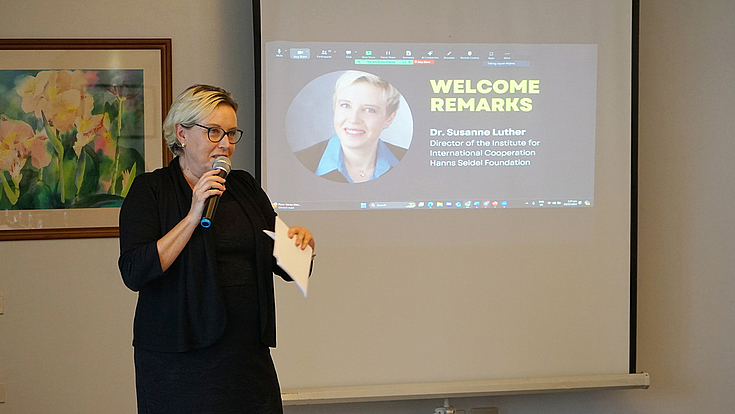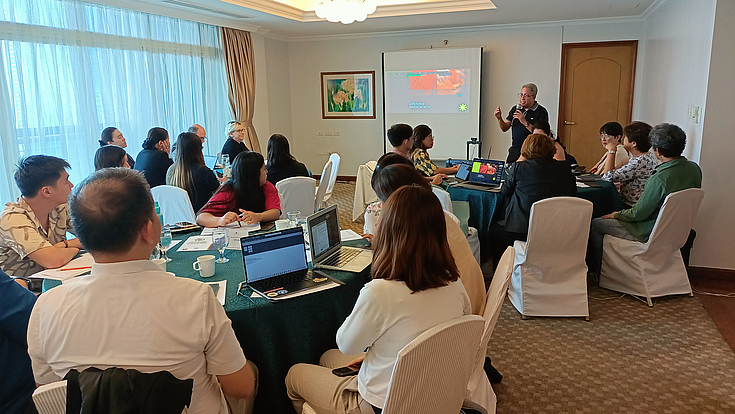Human Rights and Governance
Top-Level Policy Dialogue on Human Rights Cities and the Rights-Based Approach to Governance
Dr. Susanne Luther gave the Welcome Remarks
HSF
Dr. Luther and Mr. Alexander Birle, HSF Resident Representative to the Philippines gave the Welcome Remarks. Dr. Luther acknowledged the presence of the Project Steering Committee (PSC) members of the Community-based Dialogues project represented by the Commission on Human Rights (CHR), Alternative Law Groups (ALG), Philippine Alliance of Human Rights Advocates (PAHRA), Philippine National Police (PNP), and HSF Philippines as well as stakeholders from the government and civil society. She noted the growing interest on Human Rights Cities worldwide including in key European cities and in Asia. She said the dialogue is a good opportunity to learn more on the Philippine experience. Mr. Birle thanked the partners and participants for joining the activity to be able to discuss and address current developments on the promotion and protection of human rights with key stakeholders.
Mr. Rene Clemente, ALG Program Officer gave an Overview covering the Community-based Dialogues (CBD) project and one of its component activities, the TLPD, as well as Human Rights Cities.
Atty. Erwin Caliba and Mr. Melchor Cayabyab of the CHR presented the concept and framework of Human Rights Cities and the Rights-Based Approach to Good Governance, and the CHR-DILG Joint Memorandum Circular (JMC) No.1, series of 2014, respectively. Atty. Caliba cited the bases of Human Rights Cities - the Universal Declaration of Human Rights, and the 9 Core International Human Rights Instruments. He expounded on who are the Duty-Bearers and Rights-Holders, Why Local Governments Matter, Why Human Rights Matter at the local level, and Who Benefits from Adopting Human Rights at the Local level. He presented some definitions of and a Framework for Human Rights Cities (source: European Union Agency for Fundamental Rights). He shared CHR’s activities in localizing Human Rights Cities and ordinances for adoption.
HSF
Mr. Cayabyab discussed the CHR-DILG JMC No. 1, s. 2014 or “Strengthening of Human Rights at the LGUs through the Human Rights Action Center (HRAC)” at the level of provinces, cities, municipalities and barangays as well as human rights committees at the national (Senate and House of Representatives) and local levels. He cited the legal bases such as the Constitution, Local Government Code, and in the different branches of government-executive, legislative, judiciary and constitutional commissions, among other laws. He underscored the State obligation to human rights, and human rights structures at the national and local levels and their legal bases. He discussed the HRAC, the composition and duties of the Human Rights Action Teams (HRAcTs) and major services. He mentioned that as of May 2024, there are only 436 HRACs or 0.99% and 5% of LGUs with local ordinance establishing it throughout the country.
Police Major Judith Concina shared information on the Human Rights Recording, Analysis, Information System, and Enforcement (HuRAISE), a human rights data collecting system of various human rights issues in the PNP administered by the PNP-Human Rights Affairs Office (HRAO). Major Concina shared the development of HuRAISE, its objectives, features (data on incident, duty-holder, claim-holder, evidence) functionalities and outcome/benefits, and data on human rights violations committed by and cases filed against the PNP. She noted that there are 12 possible sources of data including CHR’s Investigation and Case Management System (ICMS). HuRAISE was launched on July 4, 2023.
HSF
Ms. Quah Wei Vei reported on the work of the United Nations Joint Programme on Human Rights (UNJP) in the Philippines., viz: (i) awareness-raising workshop on Human Rights Cities in 13 cities in Luzon, Visayas and Mindanao; (ii) ordinance on Human Rights Defenders Protection passed in the cities of Isabela (Basilan), Puerto Princesa (Palawan) and Digos (Davao del Sur) ; (iii) follow-up meeting with potential pilot cities (Baguio/Benguet, San Fernando/Pampanga, Balanga/Bataan) to talk about standards/criteria and strategy (e.g. revitalize BHRACs) for Human Rights Cities, capacity-building activities, best practices; piloting; and (iv) capacity building assessment tools.
Atty. Hannah Calitong of the Baguio City Legal Office shared the opportunities and challenges of Baguio City towards becoming a Human Rights City. She noted the resolution of the city government to work towards this end. She saw the need to review the CHR-DILG JMC as it basically deals with CSOs and not for LGUs, adding that its BHRAcTs do not investigate human rights violations (HRVs) committed by members of the city government due to conflict of interest. She mentioned that the Human Rights Defenders Protection ordinance is still pending. The LGU is conducting human rights activities in Baguio City through an Administrative Order. It has active BHRAcTs organized as a federation. It is also active in the CBD as a member of the core group. Baguio City is one of the UNJP’s pilot cities. A brief reaction on the experience of Baguio City was given by Atty. Joann dela Cruz, CHR consultant on Human Rights Cities. She acknowledged the important role of LGUs as partners in development. She finds it necessary to develop structures and tools to allow an LGU to declare itself as a HR City. She took note of the development of the Philippine Human Rights Action Plan which should adopt a rights-based approach. She also mentioned the Performance Challenge Fund, a financial grant that are given to LGUs awarded the Seal of Good Local Governance as positive indicators for a rights-based service delivery to the people.
The following were noted during the Open Forum facilitated by Mr. Rene Clemente: (i) do a study on localizing Human Rights Cities; (ii) 50-70% of world’s population are living in cities; (iii) HR Cities may face challenges in terms of limited resources; work towards progressive realization; (iv) important to involve communities in establishing HR Cities; (v) set minimum requirements/qualifications to become a HR City regardless of resources, e.g. dedicated office, levels of Human Rights Cities; (vii) complement/ consolidate local bodies or committees for a unified monitoring & evaluation; (x) revisit previous programs, e.g., UNDP Human Rights-Based Approach (HRBA) to Development Manual supported by NEDA, (xi) AECID-supported HRAC and RoL (Rule of Law) program at the CHR; (xii) reformulate DILG’s Seal of Good Governance to adopt HRBA; (xiii) HuRAISE might suffer from conflict of interest with police personnel recording complaints vs. its members; (xiv) 700 killings recorded under Marcos Jr. administration so far-how many are human rights violations?
For the Closing Remarks, Atty. Sheila Formento, ALG National Coordinator underscored the need to set minimum standards for Human Rights Cities, how to make it functional despite limited resources, and how to engage CSOs. She noted that local government units are best equipped and in a strategic position to promote civic engagement from the ground up. She pointed out that the long-term goal is to institutionalize the idea of HR Cities in the country.



